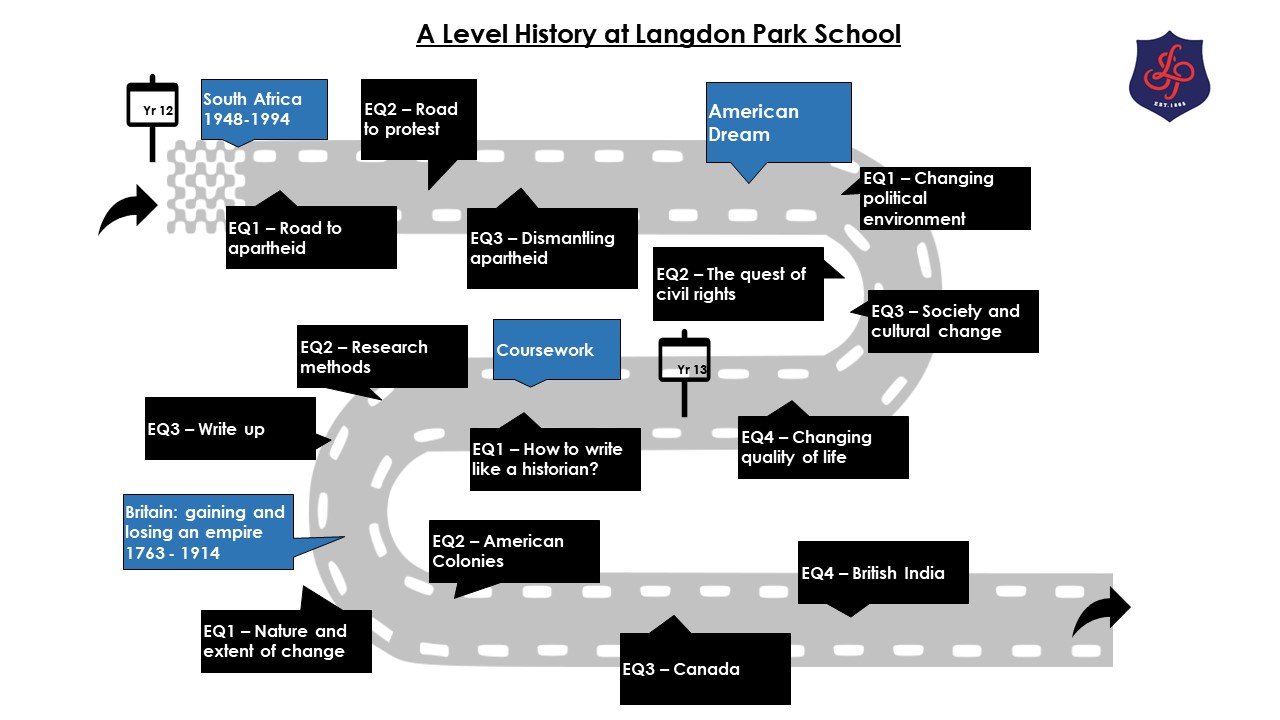History
In History, we aim to expand students’ historical understanding so that they can explore a variety of interwoven British histories that cover diverse, global, and local enquiries which speak true to their own identities.
Year 7
Learning Journey
Term1: What can artefacts teach us about Ancient Rome?
Term 1.2: How can the rise of Islam illuminate the dark ages?
Term 2: How can we view the Norman period as an age of anarchy?
Term 2.2: Why were people so prepared to risk everything for Jerusalem?
Term 3: How dark did the Black Death change life for everyone everywhere?
Term 3.2: Why has Mansa Musa been described as the greatest Mansa in history?
Term 4: Should historians remember the Ming dynasty as 'ruler of the seas'?
Term 4.2: Were the Wars of Roses a war of Mothers?
Term 5: How far did the Tudors connect Britain with the World?
Term 5.2: How mighty were the Mughals?
Term 6: Indian Diaspora throughout the Caribbean and Americas
Year 8
Learning Journey
Term 1: Did the 'Monster' really die in 1807?
Term 1.2: How did Tower Hamlets experience the 'Monster'?
Term 1.3: The Industrial revolution transformed Britain but at what cost?
Term 2: How pivotal a year was 1857 in Britain's relationship with India?
Term 2.2: How did the Enlightenment change the world?
Term 3: Consequences of the Match Women's strike
Term 3.2: 19th Century East London
Term 4: How did 2 bullets kill 18 million people?
Term 5: What can stories reveal about the many faces of war?
Term 5.2: Did women gain the vote because of window smashing?
Term 6: Was Limehouses's Chinatown a safe haven or social construct
Year 9
Learning Journey
Term 1: How far was Germany dancing on the edge of a volcano?
Term 1.2: How responsible was Hitler really for WW2
Term 2: How significant was Amidah in the face of persecution?
Term 2.2: Would the mother country have survived without her children?
Term 3: Life at home in Britain?
Term 3.2: Europe divided: Battle of the ideology
Term 4: What does partition reveal about decolonisation?
Term 4.2: Why was there so much migration to Britain after the Second World War?
Term 5: How swinging were the Sixties?
Term 5.2: How much have lives of people of colour changed in Britain since the arrival of Windrush?
Term 6: How did the people of 'Bengal' forge their places in the 20th Century?
Year 10
Learning Journey
Term 1: How much change was there in medicine in mediaeval England?
Term 1.2: How much change was there in medicine in the Medical Renaissance?
Term 2: How much change was there in medicine in the Medical Renaissance in England?
Term 2.2: How much change was there in medicine in eighteenth and nineteenth century Britain?
Term 2.4: How much change was there in medicine from 1900 to the present day?
Term 3: How much change was there in medicine from 1900 to the present day?
Term 3.2: How did the First World War impact on injuries and treatment in the British sector of the Western Front?
Term 4: How did the First World War impact on injuries and treatment in the British sector of the Western Front?
Term 4.2: The development of the civil rights movement, 1954 - 60
Year 11
Term 1: How did the Cold War begin? What were the early signs of tensions increasing?
Term 2: Weimar and Nazi Germany 1918 - 1939 - Why did the Republic fail?
Term 3: Weimar and Nazi Germany 1918 - 1939 - Why did the Republic fail?
Term 4: Weimar and Nazi Germany 1918-1939 - 'If you tell a lie big enough and keep repeating it, people will eventually come to believe it'. Propaganda was the most important reason for Hitler's rise to power. How far do you agree?
Term 4.2: 'The only thing necessary for the triumph of evil is for good men to do nothing'. How far do you agree with this statement when assessing Nazi control and dictatorship, 1933-1939
Term 4.3: How did life change in Nazi Germany 1933-39?

